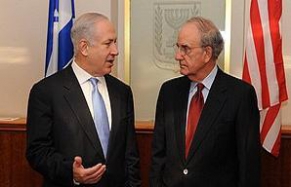|
World Jewish News

George Mitchell &Binyamin Netanyahu, photo by JPost.com
|
Mitchell drawing up 'terms of reference' to relaunch talks
29.12.2009, Israel and the World The "terms of reference" for restarting diplomatic discussions with the Palestinians are expected to be the main focus of Prime Minister Binyamin Netanyahu's discussions with Egyptian President Hosni Mubarak in Egypt on Tuesday, amid signs that US Middle East envoy George Mitchell has made inroads on this matter.
Mitchell, who hasn't been here since early November but has continued talks with Israeli and Palestinian negotiators in the US, is due back in early January and is expected to bring with him a document that would provide a basis for relaunching the Palestinian-Israeli negotiations.
AFP, in a story filed from Cairo, quoted an Arab diplomat as saying that Mitchell would present "two draft letters of guarantee, one for Israel and one to the Palestinian Authority, during his next visit to the region."
"The United States is hoping that the two letters will serve as a basis for the relaunch of Israeli-Palestinian negotiations, but we don't know if they will satisfy the Palestinians, who want a complete freeze of settlement activity before talks resume," the diplomat said.
One senior Israeli diplomatic source told The Jerusalem Post that the terms of reference Mitchell is reportedly bringing would probably closely resemble the statement US Secretary of State Hillary Clinton released soon after Netanyahu announced his 10-month housing-start moratorium in the West Bank.
"We believe," that statement read, "that through good-faith negotiations the parties can mutually agree on an outcome which ends the conflict and reconciles the Palestinian goal of an independent and viable state based on the 1967 lines, with agreed swaps, and the Israeli goal of a Jewish state with secure and recognized borders that reflect subsequent developments and meet Israeli security requirements."
Netanyahu, in a speech Monday to 140 Israeli ambassadors and heads of delegations currently in Jerusalem for a series of high-level briefings, emphasized the importance in his mind of Palestinian acceptance of Israel as a Jewish state, and said that demilitarization was Israel's key security requirement for any future Palestinian state.
Recognizing Israel as a Jewish state, Netanyahu said, was necessary for any agreement with the Palestinians that would lead to an end to the conflict.
"We want an end to the conflict," he said. "That means the Palestinians must stop attempts to use a Palestinian state as jumping-off point for further claims against Israel. No claim to flood Israel with refugees, which would mean the end of the Jewish state; and no irredentist claims to the Negev, Galilee or Israeli citizens, which would mean the dissolution of the Jewish state."
Regarding Israel's demands that any future Palestinian state be demilitarized, Netanyahu said this would necessitate preventing the import of rockets and missiles that could be fired into Israel, as was currently the situation in Gaza and Lebanon.
He said the situation in Lebanon, and the rearming of Hizbullah despite Security Council Resolution 1701 prohibiting just that, proved that agreements on paper were ineffective.
"I am doubtful that anyone can do this except a real Israeli presence, Israeli forces," he said, intimating that in any future agreement with the Palestinians, Israeli forces - not international ones - would have to be on the eastern border of a future Palestinian state to prevent it from importing arms and staging attacks against Israel.
By HERB KEINON
JPost.com
|
|
